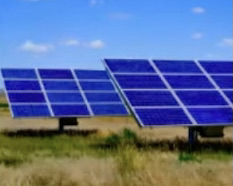Solar field bill receives mixed reactions

Fields of solar panels may provide clean energy, but some worry that they may end up hurting valuable farmland as an unintended consequence.
January 14, 2022
When Jim Thompson heard about a proposed 2,600-acre solar field in Shawnee Township, Ohio, he had some serious concerns about the safety of land in his community. As he began looking into the project, he realized he wasn’t the only concerned citizen, and he joined the group “Against Birch Solar” (ABS).
As their fight to keep the industrial solar field by Lightsource bp out of Allen County carried on last summer, Thompson and the group saw an opportunity to travel to Columbus and lobby for the passing of Senate Bill 52.
The bill, aiming to revise local awareness and input on wind and solar development within each county, went into effect in Ohio Oct. 11, 2021, according to JD Supra.
“I think everybody in our group and across Ohio is very upset that there is no local control,” Thompson said. “So, when I heard about this legislation going forward, I had to get involved.”
The law requires approval from county commissioners before any developer can move forward with the siting process for certification of utility-scale projects, Supra explains.
Once the bill was signed into law by Gov. Mike DeWine, county commissioners were given the ability to establish restricted areas where industrial wind and solar power projects are prohibited, essentially creating new zoning requirements. It also adds two voting members to the siting board to include county and township representation, the article by Supra said.
Judi Boyko, the county administrator for the Butler County Board of Commissioners, said that while the new law won’t affect the entire county, she believes it will allow more rural landowners to do more with their property.
“Senate Bill 52 provides an additional opportunity for the more rural components of Butler County to potentially utilize land in a more economic fashion if they choose to do so,” Boyko said. “Butler County is uniquely positioned in that the county enjoys urban/suburban vitality and the pastoral, rural elements of our communities.”
Thompson’s main concern focuses on responsible siting of solar resources. He said he believes public interest and local opinion should be considered as deciding factors in the approval of projects. Developers also need to be more transparent about projects during these processes, Thompson said.
“Each community faces different challenges,” Thompson said. “Our group is opposing the Birch Solar Project essentially because the developer is siting it too close to the community, and they’ve been less than honest with us during the process.”
Developers are now required to submit decommissioning plans when applying to the Ohio Power Siting Board. Some projects currently in development will be grandfathered under Senate Bill 52.
In Oxford, where solar projects are readily welcomed through programs like “Solarize Oxford,” in which residents are incentivized to seek sustainable energy, the current plans for a solar array on top of the old city landfill will not be affected by the law.
Jim Fox, from the Butler County zoning office, said there are no proposed solar projects of this scale currently in the county, but believes townships will have the most power in the situation.
“They could create zones, allowing for these types of projects, or they could do the opposite and not allow any at all,” Fox said. “In that instance, they would write to the county commissioners asking for a resolution.”
Because there are no proposed projects, local governments like Oxford Township have time to consider how they might address industrial wind or solar requests in the future.
While Senate Bill 52 helps groups like “Against Birch Solar” fight industrial solar in their communities, Thompson said aspects of the bill were changed due to lobbying efforts by developers, the Ohio Chamber of Commerce and the Ohio Farm Bureau.
Brandon Kern, senior director of state and national policy at the Ohio Farm Bureau, said that while the bureau agrees with many points in the bill, it couldn’t support others.
“Our concern is the method which this bill uses to address the concerns,” Kern said. “This bill creates a new and unprecedented level of local government regulation prohibiting certain land usage.”
Kern said that while there is a concern regarding solar taking valuable farmland, the bureau is also concerned about landowners’ rights to use their property for solar generation if they so choose.
Kern suggests giving communities more information before decisions are made to give the Ohio Power Siting Board time to take concerns into consideration, without giving county commissioners the final say.
“One of the common concerns is the projects being too far in the process before the public knows,” Kern said. “One of our suggestions is more disclosure, earlier in the process when developers enter the community, to give people some time to react.”













